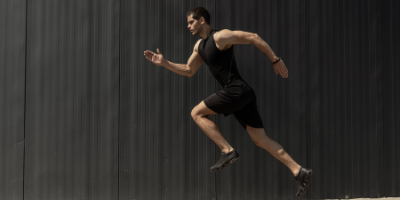How Many Times A Week Should I Run?
Many people ask the question “How many times a week should I run?”
The truth is there isn’t really a correct answer to the question. There is no rule of thumb to how often you should go running. Rather, it depends on what level you’re at, and what goals you want to achieve.
Of course, how often you run will also depend on your life, your job, family, and other demands for time. You need to find that balance. Make your running schedule fit around you!
Beginners Running Frequency

For brand-new runners, or those returning from injury, a good tip is to run one or two days a week. One or two mile jogs a week will feel like a big accomplishment if your body is not used to this form of exercise.
It is important to ease into a running routine to help strengthen the muscles necessary to avoid injury.
Gradually, as you progress, you can increase the frequency to 3 or 4 times a week on alternating days. This allows for rest days in between, making sure your body has time to recover.
As a beginner it is especially important to allow your body to rest to prevent overuse injuries.
Advanced Runners Running Frequency

Advanced runners will run about 6 times a week. If you have the time and your body can handle the effort required. Your performance will probably improve if you run more often.
If you are younger your body can handle more training with less rest days. While if you are older your body will definitely require more rest days and recovery time.
Training for a Marathon Running Frequency

If you are training for a marathon, you should generally be running 3 to 5 times a week. It is crucial to increase your mileage as you get closer to race day.
It is also important to do a long run every 7 to 10 days (minimum of 5 miles) so your body can slowly adjust to long distances. The long run should be extended by a mile or two each week.
Rest days should still promote some form of low intensity exercise such as yoga or Pilates. Just make sure to rest your legs allowing them to fully recover.
If you’re training for a marathon you should download a marathon training programme.
Are you running for weight loss?

Burning Calories
If your goal is to lose weight generally, you should run about 3 or 4 times a week on alternating days for about 45 minutes. On rest days it is still crucial to engage in some form of exercise. Moving and burning calories are key!
Most people overestimate the calories they burn on a run. Running is not a reason to ignore your diet. The reality is you will need to create an overall calorie deficit. You need to burn more calories than you eat each day.
Try work out how many calories you burn per run. As a very general estimation, you burn about 100 calories per mile. Running 2 or 3 miles is a solid workout burning about 200-300 calories.
Keep your indulgence in check as well if your ultimate goal is to lose weight. Try not to add a 400-calorie brownie to your diet after a workout because you’ve ‘earned it’.
What to eat after a run
Start with a big glass of water to help you rehydrate. Drinking a lot of water can also help you avoid inhaling everything in the kitchen since exercise and burning calories makes many people feel extremely hungry.
Eating foods that can restore your muscles, strengthen your bones, and reduce inflammation are beneficial.
Protein is key for building up your muscles again after a workout. Greek yoghurt is a great option as it contains plenty of protein and is easy to just grab from the fridge.
Another great option is avocado toast. The combination of healthy monounsaturated fat from avocados and whole grains makes for a great and easy post run bite.
A few more good options are; tofu, eggs, cottage cheese and salmon.
Strength Training
It is important to realize that cardio alone may not get you to your ideal body weight. Strength training is crucial to boost your running abilities while burning fat and building lean muscle.
Strength training means moving your body against some type of resistance. This could be your own body weight or weights such as dumbbells or barbells.
Adding resistance training to a weight-loss regimen may help you drop pounds and conserve lean body mass better than just engaging in cardio training. Just remember to allow your body to recover properly!
Lastly, don’t forget to stretch after your run! Stretching after running can help decrease injury. Stretching also helps prevent soreness and cramping after running.
Are sports massage good for running?
Sports massage is a type of massage that helps to break down tension, tightness and restriction within your muscles. Tension, tightness and restriction can often prevent you from running at your best.
Sports massage is used by many runners to help reduce their muscular tension, improve their movement and help to prevent injury.
If you’re running regularly and haven’t had a sports massage, you need to contact your local sports therapist and get booked in. You’ll be grateful you did!
Author
Tyler Lowe – Health & Wellbeing Speaker
BSc Sport & Exercise Rehabilitation

